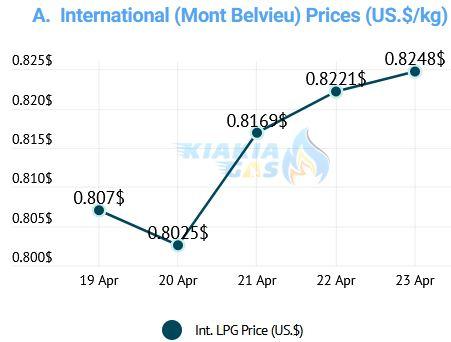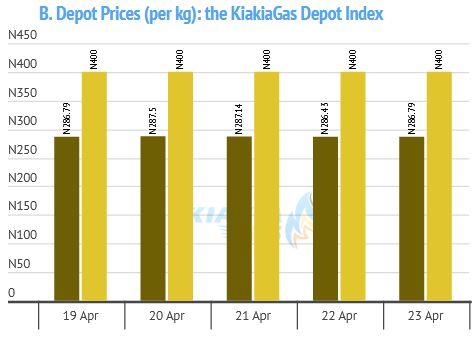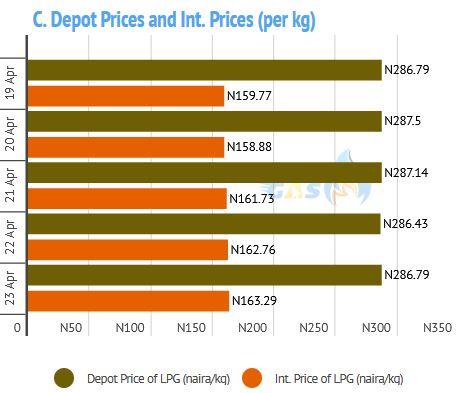WEEK 69: Weekly LPG Insider Report
In the immediately preceding week, prices in the foreign market were on a risen note after an initial decrease and domestic markets for LPG fluctuated during the week

In the immediately preceding week, prices in the foreign market were on a risen note after an initial decrease and domestic markets for LPG fluctuated during the week

In the immediately preceding week, prices in the foreign market were on a risen note after an initial decrease and domestic markets for LPG fluctuated during the week
There was an initial drop in the international prices of LPG at the beginning of the week, it then kept rising till the end of the week but ended on a fallen note.
Depot prices fluctuated during the week compared to the previous week.
The narrowing of price disparities between prices at the depot level and those at the international level has remained stable, despite a relatively higher price in the foreign markets.
In the week under review, the price increased per kg of LPG and has been within the stable ranges with in the last few weeks.
Disparities in LPG retail prices throughout the country still persist due to transportation cost and closeness to the coastal region.



![]()
A daily feature of the Nigerian LPG market was regional variance in LPG prices across the country. Because of the distance from coastal areas the South-East region has the highest price.
Inflation Rate and the LPG: Over the last 13 months, the rate of inflation has been steadily increasing. Inflation rose from 16.47 percent in January 2021 to 17.33 percent in February 2021. (Fig D). From 14.89 in November to 15.75 in December of the following year. The composite food index increased to 21.79 percent in February 2021, up from 20.57 percent in January 2021, 19.56 percent in December 2020, and 15.48 percent in July 2020, up from 15.18 percent in June 2020. The outbreak of the Covid-19 pandemic, as well as Nigerian land border policies against essential goods, are leading to the rising trend. As a result, the monetary value of goods and services is reduced by inflation. If the price of LPG rises, so does the number of people who buy it.
Exchange Rate and the LPG: The exchange rate remained at N380 to $1 for the entire week due to the continued growth of inequalities in the parallel market. The exchange rate is one of the factors that influences LPG prices on the international market. A higher exchange rate would boost the price of LPG on the local market by a considerable amount. This means that the LPG market is in a state of flux Figure E.
Crude oil Price and the LPG: The relatioship between LPG price and crude oil price remains positive, as a by-product of crude oil. Crude oil prices reached its lowest points at the middle of the week but showed some appreciation towards the end of week (Figure F). This shows that the price of crude oil has not been stable in the international market and that the price of LPG fluctuated. This reflects variability in the market price for LPG
Foreign Reserves: As in the previous week, the Nigerian Gross Foreign Reserve showed some level of depreciation from $35.19 billion to $35.15 billion amid the fluctuation in the price of oil and pegging of the Naira at N380 to US$1. This will signal to the investors and country's creditors the strength of naira and ability to repay debt.
PMI: The CBN Purchasing Managers Index (PMI) recorded overall growth in employment, business and inventory in the month of December while ordering in the category of supply for power, gas, steam and air conditioning remained stagnant while business operation & inventory were static in the same month at 45.7 per cent.
Covid-19: The effect of Covid-19 still persist as not all Federal Schools have fully resumed while the State universities are taken caution to prevent the spread of the virus. The implications of this on the LPG market is that its volume of sales will not increase in the areas where schools are not yet resumed.
Ramadan Period: Fasting still persisted among the Muslims all over the world in the preceding week. The rate of cooking at home increases during the period and many households who are Muslims are already prepared to avoid disappointment from unreliable cooking energy. Muslims in Nigerians were observed filling their gas cylinders in order to have access to fast cooking energy. This fasting will last for a period of one month, and it is anticipated that demand for cooking gas will increase during the period.
Reducing the effect of the Covid-19, entails more campaign and public awareness of the virus as people are easily carried away and relaxing. Vaccines for Covid-19 should be distributed without much delay if available.
Nigerians are advised to take the AstraZeneca COVID-19 vaccine, manufactured by the Serum Institute of India to be immune against the virus.
The prices in the weeks to come may rise due to the effect of increase in the rate of inflation.
The Nigerian LPG Market is the next success story of the Global LPG industry, if you need a partner with a global perspective and local expertise in the Nigerian and African space, kindly book for a free session with our team of experts to help you http://www.kiakiagas.com/book-session or write us an email at advisory@kiakiagas.com or Whatsapp: +2348085269328